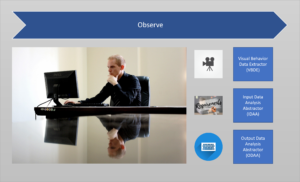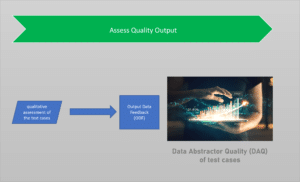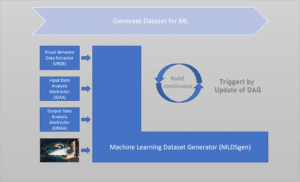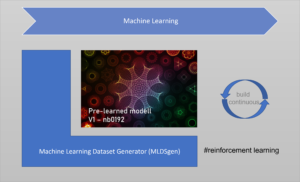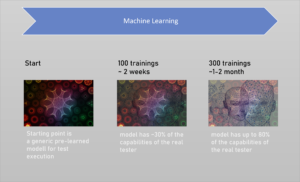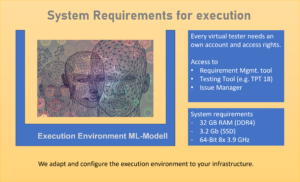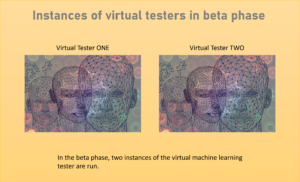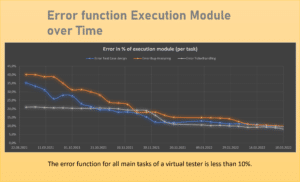
Our 2022 April Fool's joke
Obsolete Real Tester
Our new product Obsolete Real Tester (ORT) keeps what the name promises.
1.5 years ago we had the idea to replace the real tester in front of the screen with a virtual presence. Thanks to AI, we have now made the breakthrough and completed the internal alpha phase.
We are now pleased to announce that the product, which will be available for a fee in the future, will be available as a beta release.
The release will be simultaneous with our TPT 18.
Use-Cases of ORT
As a manufacturer of the best test automation solution for software based embedded products and as an engineering partner of many OEM/Tier1 we have noticed how difficult the job market is to find high class testers.
Our solution helps to solve this problem. Instead of looking for and hiring additional testers, clone your existing test team. Once clones are created, they can be instantiated multiple times. The only limit you have now is your infrastructure.
Depending on the phase of development, you can scale your virtual test team and develop in a cost-optimized way.
Each individual clone can reach up to 80% of the performance level of the original through normal learning. In the first step, you can compensate for the missing 20% with your existing test team. In the future we will improve the clones through a feedback module. Our experts estimate that in 2 years at the latest we will reach the performance of the clones to 300% compared to the original.
Our solution offers you the following advantages:
- 1. Scalable test team at the push of a button.
- 2. Higher product quality and therefore faster Time2Market
How does ORT work?
Our Obsolete Real Tester (ORT) consists of three modules:
- 1. Learning Module
- 2. Execution module
- 3. Reward Module (in development)
All three modules are executed at different times. First, the behavior of a real tester in their environment and with their infrastructure must be learned. What has been learned can now be applied in their environment after a certain learning time. In order to continuously improve what they have learned, they have to give feedback to the tester clone on a recurring basis.
Learning Module
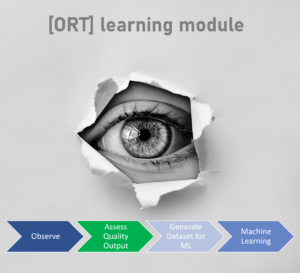
The learning module is installed on the computer at one of their physical testers. The module requires about 160 hours of presence of a real tester. The tester’s work is recorded by the Observer application by monitoring his screen, his mouse and keyboard inputs and the IT systems used. In addition, the real person is monitored with at least one camera. The collected data is analyzed daily and abstracted and stored in a data protection compliant manner.
The daily results (created test cases based on requirements) are evaluated by an outstanding person regarding quality and abstracted privacy compliant in the Data Abstractor Quality (DAQ) application. The data sets created in the Observer and DAQ form the basis for learning, but must first be processed by the Machine Learning Dataset Abstractor application (MLDSgen). With at least 5 datasets (1 DS per day) the training of the reinforcement machine learning model can be started.
The initial model learned by us in the alpha phase will be adapted with the dataset in such a way that after a short time you will have a virtual clone, i.e. an image of your real tester. You can instantiate this clone in the execution module as often as you like. It behaves like your test model.
We recommend that you choose your best tester when learning. According to our alpha tests, the virtual tester will have about 85-90% of the performance level of your test model at the start.
Execution Module
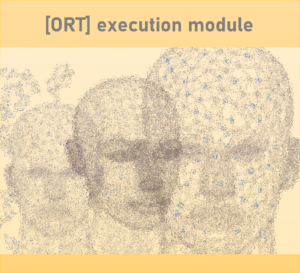
The execution module instantiates tester clone.
The clone will, like its test role model, analyze requirements, bind test objects and analyze errors and set bugs. To create new tests based on new requirements, they still need to pass the requirements in exactly the same format. The language must be fundamentally different in content but not in semantics.
The clone needs its own computer, its own account and access to the IT systems (ticket system and requirements management) for execution.
We have designed the execution module so that they can set the working hours of the clone. Thus, they can avoid problems with licensors.
Reward module
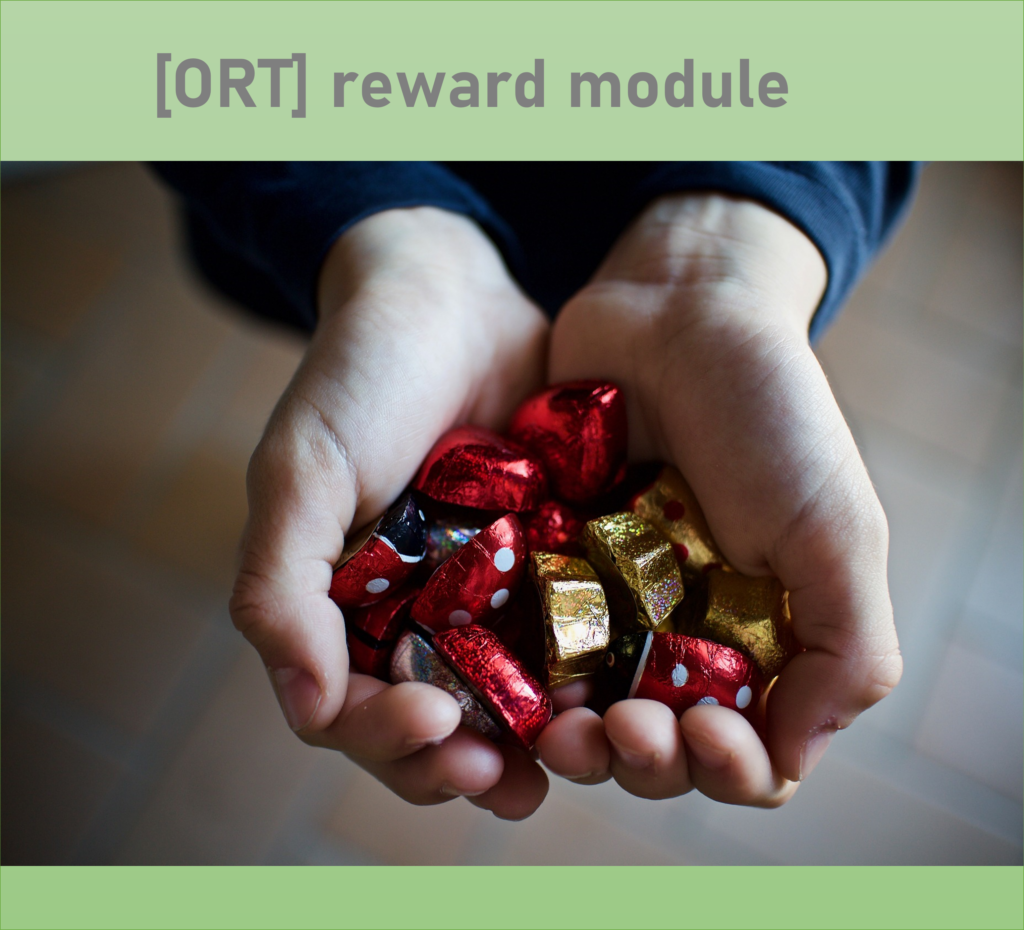
The rewards module was the trickiest for us to implement and will not yet be available at TPT18.
We want to develop this together with them in the beta test. The goal is to reward the execution module for particularly successful actions (coverage increased, tickets processed quickly, errors found) so that the system develops independently.
Cost of Obsolete Real Tester (ORT)
The development of ORT is not yet complete and is currently in the beta phase.
With the end of the beta phase we will determine the total costs and announce the pricing model.
The following assumptions have already been made – without guarantee. The Learning Module will be offered at a fixed price. The Execution Module will be priced per instantiated clone per year. The costs for the Execution Module are expected to be significantly lower than the costs of a real tester.
Get more information and apply now as a beta tester.
What qualifies you for the ORT beta test?
Therefore, we will only work with two existing customers and 4 new customers in the beta phase.
- With two existing customers, we want to use TPT18 to learn which organizational and technical measures need to be initiated to be able to launch ORT within 3 months.
- With two new customers, we want to learn how long it takes to equip the new customer with TPT 18 and ORT.
- With two other new customers we want to learn how long it takes to equip the customer with ORT on any existing test solution.
Unfortunately, our resources are still limited, and we want to provide top service, which is why we can’t serve more than six customers in the beta phase.
In order to provide equal opportunities, you can apply for the beta phase.
The following requirements must be met for your application as existing customer:
- TPT used in the automotive environment for at least 3 years.
- At least 1 (better 2) testers in their department with Pro knowledge are available to the project full time for 6 weeks starting May, 30th 2022.
- You sign a non-disclosure agreement with us.
The following requirements must be met for your application as new customer:
- At least 1 (better 2) testers in their department with Pro knowledge are available to the project full time for 10 weeks starting July, 4th 2022.
- You sign a non-disclosure agreement with us.
Benefits
All companies with beta testers involved will get 50% discount on ORT for 5 years from 1st official release.
Application deadline
We will consider all applications until 15th April 2022 – 12.00 a.m. (GMT+1).
